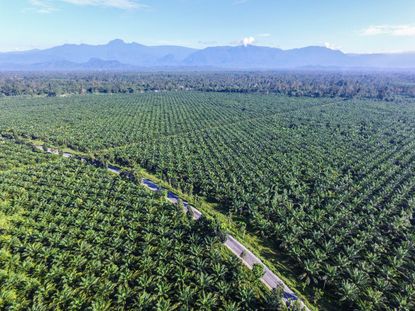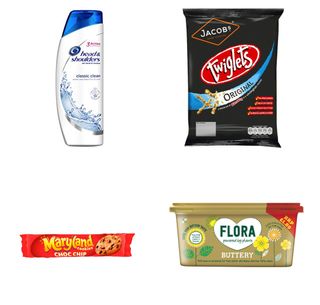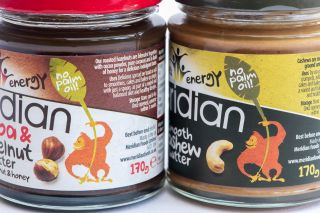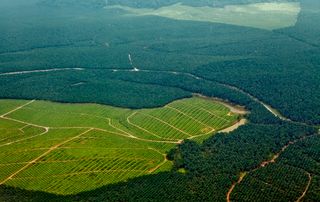Palm oil products - and why palm oil is bad for the environment


In recent years, consumers have been made increasingly aware of the devastating consequences palm oil products can have on wildlife and the environment.
The rapid and extensive production of this cheap vegetable oil has hugely contributed to the current climate crisis.
Iceland’s 2018 banned palm oil advert was a major turning point in this rise of awareness - using a Greenpeace animation of an orangutan to highlight how palm oil production is endangering species and their natural habitats.
Big name companies promised to make a change to their palm oil products in the advert’s aftermath. And, whilst sustainable palm oil use is on the rise, research reveals the oil still appears in almost HALF of the items sold in UK supermarkets today.
“Palm oil is in nearly everything – it’s in close to 50 percent of the packaged products we find in supermarkets, everything from pizza, doughnuts and chocolate, to deodorant, shampoo, toothpaste, and lipstick,” says the World Wildlife Fund.
Palm oil products
Though there has been some effort to switch to sustainable or organic palm oil, there are still big-name brands that have yet to take responsible steps.
Greenpeace exposed the depth of the problem in 2018, naming 12 companies in particular – including Kellogg’s, L’Oreal, Mars and Nestle - as 20 suppliers most responsible for destroying the habitat of orangutans because of palm oil. Some of these companies have switched to sustainable palm oil since, but the damage remains.
GoodtoKnow Newsletter
Parenting advice, hot topics, best buys and family finance tips delivered straight to your inbox.
Palm oil is used in these products for various reasons:
- Soap and Shampoo: Palm oil is featured in soaps and shampoos as it helps to create bubbles and foam, which removes dirt and oil from your skin and hair.
- Lipstick: Palm oil is odourless and flavourless and helps to achieve a smooth, colour-rich application for many cosmetic brands.
- Peanut butter: Palm oil is often added as it’s a neutral flavour, and is used to give it a creamier consistency and make it easier to spread.
- Ice cream: Palm oil thickens the consistency of ice cream and helps it melt at a slower rate.
- Instant Noodles: These can contain around 20 percent palm oil, which is used to pre-cook the noodles.
- Bread: Packaged breads commonly contain palm oil, because it’s cheap and stays solid at room temperature.
- Butter/Margarine: Palm oil is used to stop spreads from going off faster. The oil prevents their productions from reacting with oxygen which causes it to smell and taste funny.
- Pizza: Palm oil retains the doughy texture of frozen and fresh pizzas, stopping the toppings from sticking together.
- Chocolate: Chocolate’s shiny appearance and smooth texture is aided by palm oil.
- Cookies and biscuits: Unsurprisingly, you can expect to find palm oil in a number of chocolate-based biscuits. It also gives cookies their soft yet crunchy texture.

Products that contain palm oil:
- Soap and Shampoo: Dove, Simple, Radox, Baylis and Harding, Head and Shoulders, and Herbal Essences contain palm oil. Body Shop uses sustainable palm oil.
- Lipstick: Max Factor, Rimmel and Revlon use a mixture of regular and sustainable palm oil in their products. Loreal uses sustainable palm oil.
- Peanut butter: Skippy contains regular palm oil. Tesco, Sainsbury’s and Morrison's own brands contain sustainable palm oil.
- Ice cream: Wall’s soft scoop, Nobbly Bobbly and Fab contain regular palm oil.
- Instant Noodles: Pot Noodles contains regular palm oil, Batchelor's SuperNoodles contains sustainable palm oil
- Pizza: Goodfella’s, Dr. Oetker, and Chicago Town contain both regular and sustainable palm oil. Dominos contains sustainable palm oil
- Bread: Hovis, Allinson, Kingsmill, Sunblest, Village Bakery, Tesco, Morrison and Sainsbury’s own brands contain sustainable palm oil. Warburton’s has the best rating for sustainable palm oil use from the Ethical Consumer.
- Butter/Margarine: Bertoli, Flora, Clover, Country Life, Utterly Butterly and I can’t Believe contain sustainable palm oil.
- Cookies, biscuits, crackers: Maryland cookies, Jammy Dodgers, Wagon Wheels, Oreo, McVities, and Ritz crackers contain sustainable palm oil.
- Chocolate: Dairy Milk, Cadbury’s Roses, Mars, Aero, Ferrero Rocher, Kinder, Nutella contain sustainable palm oil.
Labels of products containing palm oil can often mislead customers, with the oil sometimes disguised under another name on the ingredient list. Luckily the WWF have listed a number of palm oil derivatives to bear in mind when checking food or beauty products:
Vegetable Oil, Vegetable Fat, Palm Kernel, Palm Kernel Oil, Palm Fruit Oil, Palmate, Palmitate, Palmolein, Glyceryl, Stearate, Stearic Acid, Elaeis Guineensis, Palmitic Acid, Palm Stearine, Palmitoyl Oxostearamide, Palmitoyl Tetrapeptide-3, Sodium Laureth Sulfate, Sodium Lauryl Sulfate, Sodium Kernelate, Sodium Palm Kernelate, Sodium Lauryl Lactylate/Sulphate, Hyrated Palm Glycerides, Etyl Palmitate, Octyl Palmitate and Palmityl Alcohol.

Products by these brands don’t contain palm oil or use certified sustainable palm oil:
- Soap and shampoo: Lush’s Ro’s Argan and Olive Tree Gourmet Soap, Lucy Bee organic collection, Ethique, Conscious Skincare, Friendly Soap.
- Lipstick: Axiology, Odylique, Beautiful Me.
- Peanut butter: Meridian, Pip and Nut, KP Crunchy Peanut Butter, Raw Health.
- Ice cream: Ben & Jerry’s.
- Chocolate: Divine, Tony’s Chocolonely and Montezuma.
- Butter and margarine: Yeo Valley and Lurpak.
- Snacks: Bear YoYo fruit rolls and Nakd bars.
- Cookies and biscuits: Doves Farm, Biona.
- Bread: Biona, WeightWatchers bread, Warbutons Danish White, Waitrose Essential Wholemeal, Duchy Organic.
- Instant noodles: Kobuto noodles and Itsu chilli miso noodle pot.
https://www.youtube.com/watch?v=JdpspllWI2o
Following their 2018 palm oil advert, Iceland pledged to remove or change all their own label palm oil products by December of that year. The supermarket announced this palm oil target was met in April 2019. Though the BBC discovered that the supermarket had to remove their name from a number of their own products still containing the oil, in order to meet this pledge.
Online grocery site Ocado has made efforts to push non-palm oil products. Their ‘palm oil-free aisle’ has 5,000 plus products for customers to choose from.
Marks and Spencer is one store that has recognised its reliance on the oil and has switched to sourcing sustainable palm oil for products. “We buy less than 0.01% of the world’s palm oil but we’re determined to make sure this doesn’t contribute to deforestation. We’ve been working since 2006 to source more sustainably produced palm oil,” their website states.
The Ethical Consumer named Marks and Spencer as one supermarket whose palm oil use is certified by the Roundtable on Sustainable Palm Oil (RSPO). According to WWF, RSPO certification is seen as “an essential tool that can help companies achieve their commitments to palm oil that is free of deforestation, expansion on peat, exploitation and the use of fire.”
The Body Shop is another company that switched to RSPO certified palm oil in 2011.“Our supplier, based in New Britain, Papua New Guinea, has been certified by RSPO,” their website states.

Why are palm oil products bad for the environment?
Palm oil products are incredibly harmful to the environment because of how palm oil is produced. Grown in tropical rainforest regions around the globe, vast plantations of palm oil trees are planted so their oil can later be extracted, which has led to widespread clearing of natural forests with worrying consequences.
The Rainforest Action Network states that the areas most vulnerable to deforestation are those in Indonesia and Malaysia, where 90 percent of the oil is produced. “Rainforests in Indonesia alone are being cleared and burned for palm oil at unprecedented rates,” says the environmental organisation. Further research from Rainforest Rescue shows that the equivalent of 300 football fields are being destroyed every hour.
This alarming level of deforestation has resulted in concerningly high CO2 levels, and a harmful loss of biodiversity. Indonesia is now one of the world’s largest emitters of carbon dioxide.
The country has also become the third-biggest contributor of greenhouse gases after China and the USA. This is largely because of deforestation, reports Greenpeace, who states on their website. “In Indonesia, companies drain carbon-rich peatland forests to create palm oil plantations. When you drain peatland forests they become flammable. Once these forests ignite, it becomes very hard to control and it releases a staggering amount of carbon dioxide into the atmosphere.”
Researchers at Harvard and Columbia Universities found that the smoke from one mass Indonesian blaze in 2015 may have caused 100,000 premature deaths.
While the mass clearings have devastated 55 to 60 percent of Malaysia’s forests - especially in Borneo. This has resulted in the loss of habitats for many endangered species such as orangutans, elephants, rhinos, and tigers. Activist group Extinction Rebellion have called the practice of deforestation "devastating" for biodiversity and the animal species population as orangutans alone have lost 80% of their habitat in the last 20 years.
Purchasing palm oil products - often unknowingly - is the main cause of this enormous environmental crisis. The Palm Oil alliance states that 73 million tonnes of palm oil is produced every year. And research shows an increasing demand for palm oil in the future.
By 2050, the worldwide palm oil production is expected to triple between 120 and 156 million tonnes.

Alternatives to palm oil
Palm oil production is a valuable source of income in some developing countries and the issue of balancing human need while safeguarding animals and the environment is complicated. There are other sustainable options, such as coconut oil and rapeseed oil, although they’re more expensive and don’t produce as much per hectare.
Boycotting palm oil in favour of these more sustainable vegetable oils is also not a viable option, according to the Zoological Society of London (ZSL).“If other vegetable oils are used instead this will require more land, and lead to greater habitat and biodiversity loss,” they state on their website. “Instead, retailers and consumer goods manufacturers should develop robust sourcing policies committing to purchasing palm oil that protects natural habitats and wildlife populations, as well as the rights of workers and local communities.”
This is why ZSL and 47 other conservation organisations, like WWF and Conservation International, signed a statement supporting “a move to sustainable palm oil and not a blanket boycott.”
The global biotech industry is also playing its part in finding alternatives to palm oil. According to the BBC, scientists are currently working on a synthetic palm oil alternative that isn’t made in rainforests. This looks at converting food waste into a product very similar to natural palm oil. This fermentation process is currently being worked on by researchers in New York, California, and Bath in England.
Though research into this is in its early stages, it certainly sounds promising.
What you can do
- Download the app Giki, which helpfully tells you if a product contains palm oil when you scan the barcode.
- Buy own-brand products from shops that use RSPO certified palm oil. Think Marks and Spencers, Waitrose, or The Body Shop.
- Check a company’s palm oil rating on the WWF’s buyers scorecard. This shares whether they use RSPO certified palm oil and how many tonnes they have used to date.
- Sign petitions, such as Rainforest Rescue’s Stop dirty deals with palm oil or Greenpeace’s Save Rang-tan.
- Support charities such as Greenpeace, WWF, and the Rainforest Foundation, which are trying to put a stop to palm oil production.
- Support animal-based charities that are actively affected by palm oil’s production. Consider donating to the Orangutan Foundation International or Save the Orangutan
- Educate yourself further with resources from the RSPO, which share more information on sustainable palm oil making.

Emily Stedman is the former Features Editor for GoodTo covering all things TV, entertainment, royal, lifestyle, health and wellbeing. Boasting an encyclopaedic knowledge on all things TV, celebrity and royals, career highlights include working at HELLO! Magazine and as a royal researcher to Diana biographer Andrew Morton on his book Meghan: A Hollywood Princess. In her spare time, Emily can be found eating her way around London, swimming at her local Lido or curled up on the sofa binging the next best Netflix show.
-
 Grandmother’s tip for spending more time with grandchildren leaves the internet divided, as some parents view it as ‘manipulation’
Grandmother’s tip for spending more time with grandchildren leaves the internet divided, as some parents view it as ‘manipulation’A grandmother sharing her tip for spending more time with grandchildren, has left the internet divided. While some love her idea, others brand it 'manipulation.'
By Lucy Wigley Published
-
 BookTok is recommending 'explicit' and 'violent' reads to teens warn experts - here are 3 tips for keeping kids safe from mature content
BookTok is recommending 'explicit' and 'violent' reads to teens warn experts - here are 3 tips for keeping kids safe from mature contentLots of kids are enjoying the book recommendations they get online, but many are being exposed to what users call 'spicy' reads
By Charlie Elizabeth Culverhouse Published